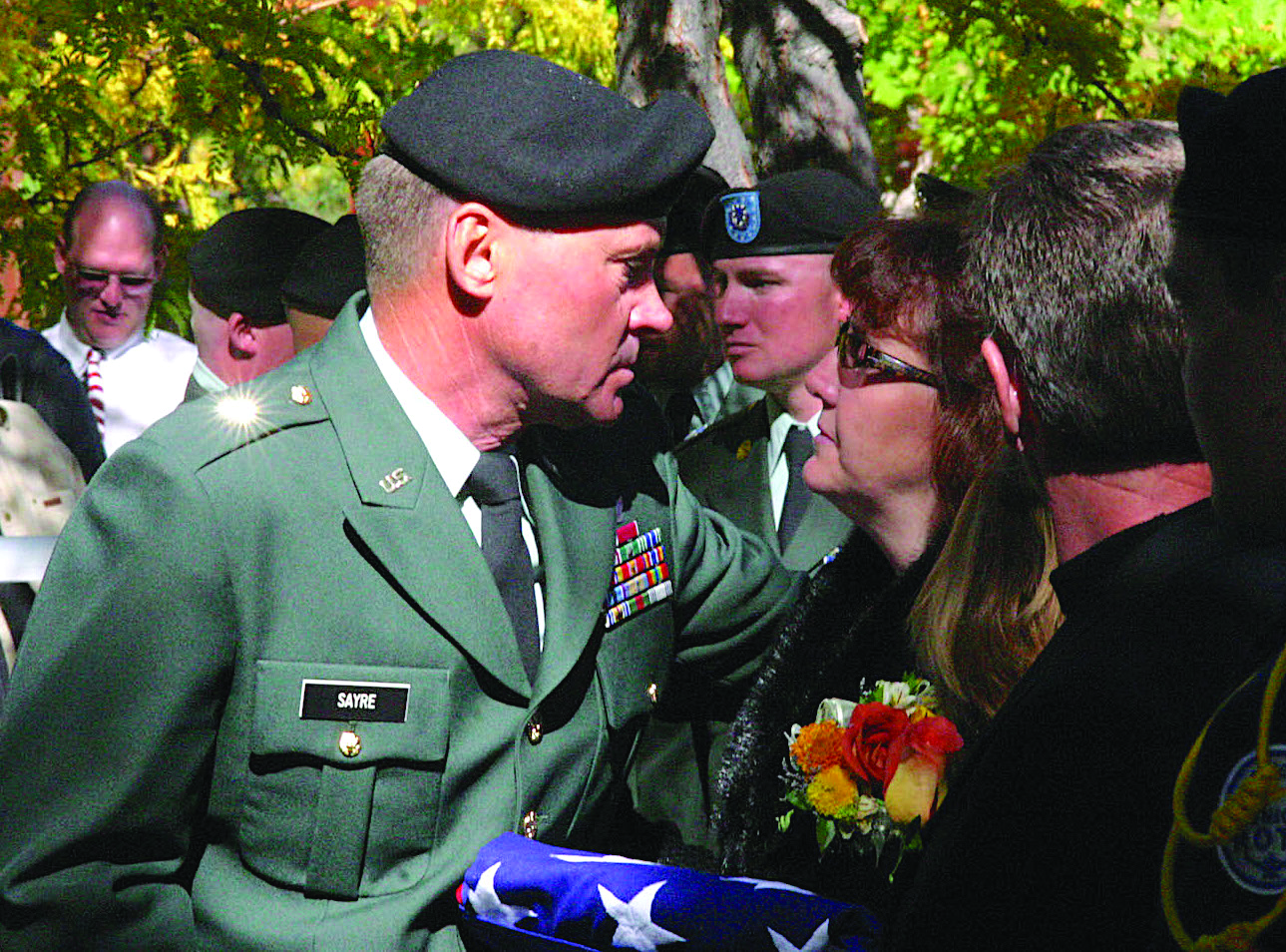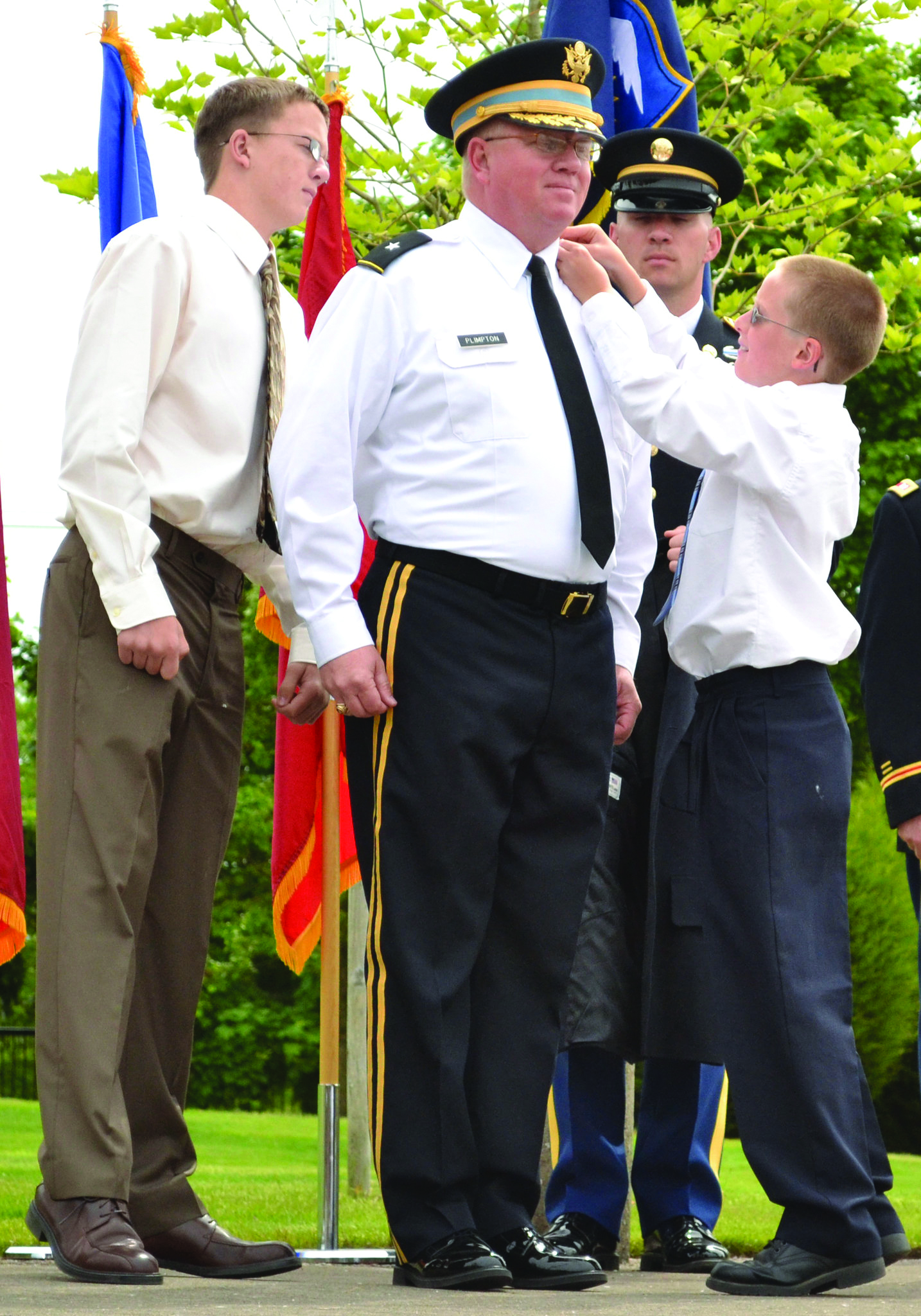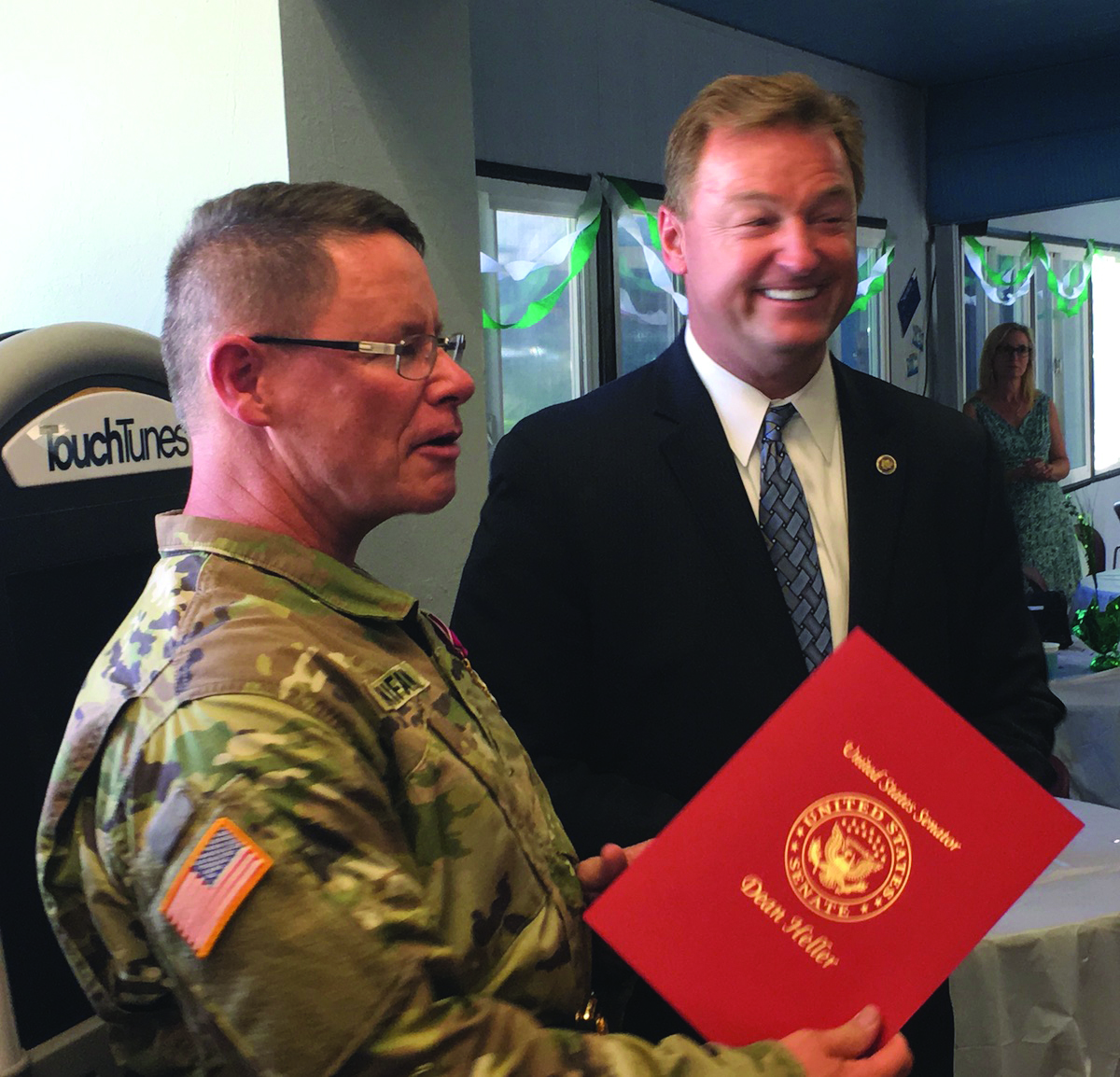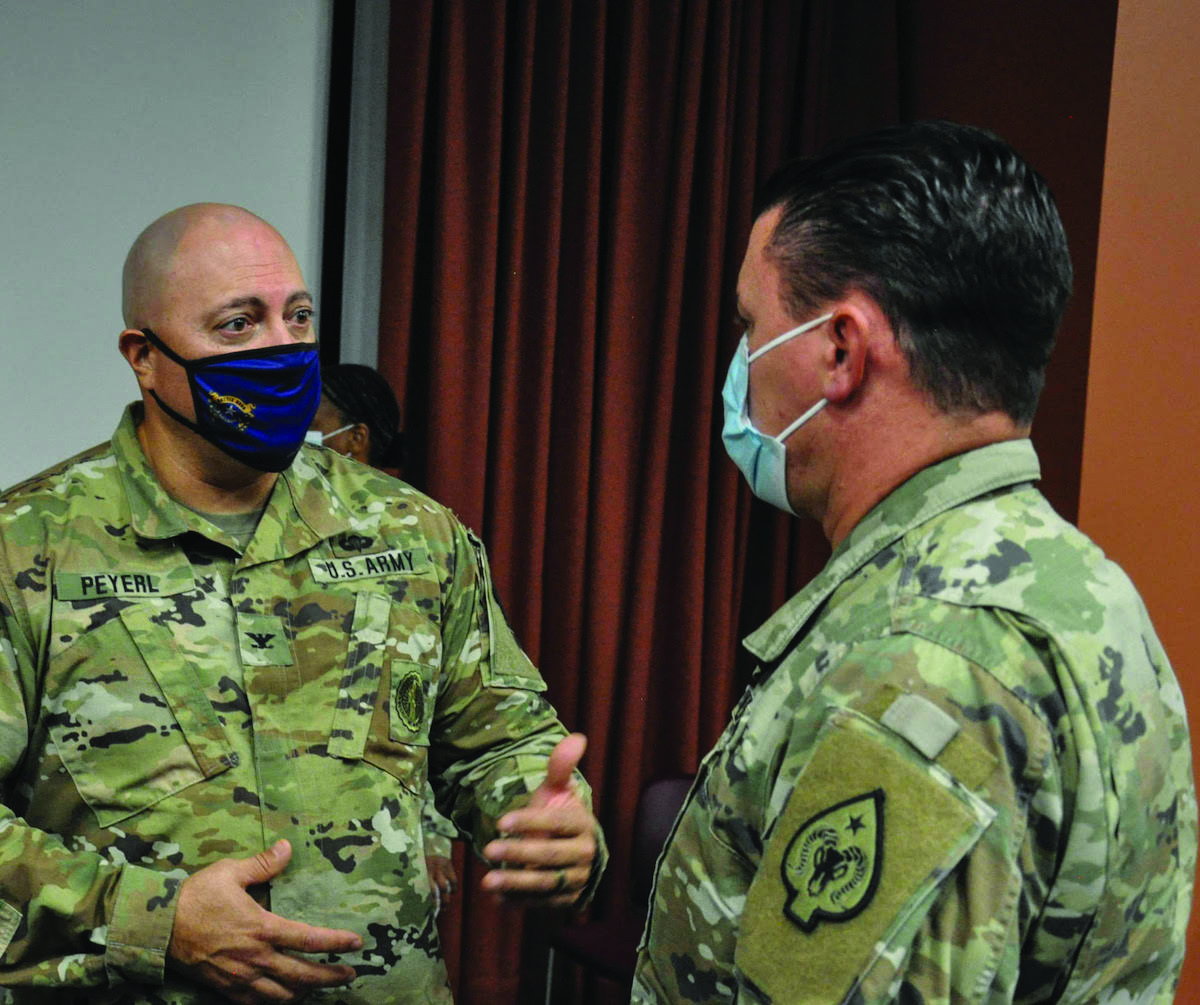Fallon residents have grown accustomed to the Naval Aviation Warfighting Development Center — aka Top Gun — and its mission over the clear blue Nevada skies and parched desert land below as pilots train for any conflict in the world.
Churchill County, though, also takes pride in the number of men and women who have enlisted in the National Guard, yet during the last generation of soldiers, Fallon claimed another distinction … the home of four one-star generals.
Seldom does a high school have four brigadier generals commissioned to serve in the Army National Guard.
Randall “Randy” Sayre, the first local man among the four promoted to brigadier general, pinned on his stars in February 2003 followed by Todd Plimpton in April 2012, Michael Hanifan in September 2013 and most recently Michael Peyerl almost 20 months ago. Only Plimpton spent the majority of his National Guard time in Oregon, not Nevada.
What do the four retired general attribute to their success to becoming military generals. In separate interviews, each general said the key to success came from both the Churchill County schools, their teachers and the community itself.
Fallon residents have grown accustomed to the Naval Aviation Warfighting Development Center — a.k.a. Top Gun — and its mission over the clear blue Nevada skies and parched desert land below as pilots train for any conflict in the world.
Churchill County also takes pride in the number of men and women who have enlisted in the National Guard. During the last generation of soldiers, Fallon claimed another distinction … the home of four one-star generals.
SAYRE COMMISSIONED THROUGH ROTC
Sayre, a 1971 Churchill County High School graduate, received his Bachelor of Arts degree in criminal justice from the University of Nevada, Reno in 1975. He was also commissioned a second lieutenant in the U.S. Army Reserve before attending and completing his Office Basic Course at Ft. Rucker, Alabama and reported to the Republic of Korea for a one-year deployment.
Joining the military, though, was hastened by the draft.
“I was a product of circumstance,” Sayre said. “I ended up being drafted. At that time there was still a war going on in Vietnam.”
Once Sayre returned home to Fallon after spending several days at the Oakland Army Base, Sayre’s father, Merlin “Jack” Sayre, sat down with him to discuss future options to delay his son’s entry into the military. Jack Sayre, a veteran of World War II and the Korean War who died in 2015, told his son options existed.
“The University of Nevada, Reno is a land grant college, and you can be drafted unless you enroll in ROTC (Reserve Officer Training Corps),” Jack Sayre told his son.
According to Randy Sayre, his father said it was best to receive a college degree and be commissioned a second lieutenant upon graduation from UNR.

Brig. Gen. Randall “Randy” Sayre comforts Roberta Stewart at a military service in October 2005 at Reno’s Rancho San Rafael Regional Park for her late husband, Sgt. Patrick Stewart, who was killed with four other National Guardsman on Sept. 25, 2005, in Afghanistan.
Steve Ranson, file
“I didn’t know a lot about the military, but I took to it like fish to water,” he said. “Through ROTC, I developed a taste for aviation.”
As a college student, he passed the test for his private pilot’s license, and although Sayre was commissioned as an infantry officer, he completed his officer basic training in aviation.
“I did well in the course,” Sayre recalled. “I was the only infantry/aviation officer in America and sent on a deployment to Korea. I first reported to Taegu (in southeastern Korea), and three months later, I was transferred to another tour with the position of flight ops (operations) director. We were close to the border.”
Sayre said being near the demilitarized zone (DMZ) pushed the soldiers to be on their “A” game.
“They (North Koreans) wouldn’t hesitate to let you know they were there,” he added.
In November 1979, Sayre returned stateside to Fort Ord, California, assigned as platoon commander with the GSC 7th Aviation Battalion, 7th Infantry Division. It was at Fort Ord where Sayre and Robert Herbert, another pilot but in a different unit, became friends — a friendship that lasted for almost a half century until Herbert died in an automobile accident south of Las Vegas in September 2022.
Before leaving active duty and returning to Nevada where he became an evacuation pilot with the 1150th Medical Detachment (Air Ambulance), Sayre eventually persuaded Herbert to relocate to Nevada to become a test pilot. Instead, the Nevada Army National Guard hired Herbert as a technician, who years later took a job on the late Sen. Harry Reid’s staff in Washington, D.C.
Sayre also had a long, distinguished career with the Nevada Gaming Control Board for more than 30 years, and in 1979, he was named Gaming Regulator of the Year by the International Masters of Gaming Law. The guardsman also remembers his hot, dry summers training at Camp Roberts, a California Army National Guard post straddling the Salinas River in the middle of the state.
“I was in medevac (medical evacuation) operations a Camp Roberts, or what I call a big training grounds,” Sayre said. “I flew medevac for the operations.”
Sayre progressed through the ranks culminating when he was named commander in 2003 of the 2,000-member Nevada Army National Guard and assistant adjutant general for Nevada.
The Fallon native considers his last decade in uniform as one of the hardest stretches of his military career.
The hijacking of four passenger jet planes by terrorists on Sept. 11, 2001 resulted in the deaths of 3,000 civilians, first responders and military personnel. In less than two years, the United States and its allies invaded Iraq because it was reported the Saddam Hussein regime continued to stockpile and manufacture weapons of mass destruction.
The Taliban gave al-Qaida terrorists, who were responsible for the jet hijackings, safe haven in Afghanistan. Five years after the United States mounted an offensive in Afghanistan, tragedy struck a Nevada Army National Guard Chinook helicopter, Mustang-22, after it had lifted off from Kandahar Air Base on Sept. 25, 2005. A rocket-propelled grenade fired by the Taliban brought down the helicopter resulting in five deaths.
“This was the hardest thing I had to do,” Sayre said when dealing with the deaths of the Guardsmen – two from Nevada and three from Oregon. “It was gut-wrenching. Once is too many.”
Sayre become a comforter-in-chief for family, friends and soldiers affected with the deaths of Chief Warrant Officer 3 John Flynn and Sgt. Patrick Stewart.
“We had challenges, but I appreciated the active component,” Sayre said of the days after the Sept. 25 incident.
Sayre was an advocate for his soldiers during wartime. He insisted the state’s deployed soldiers and their vehicles had proper armor.
“The second hardest challenge was breaking through the bureaucracy,” Sayre said. “They (active Army) pushed back. I pushed back harder. I lost a Chinook over there, but all the other cadres of people came back — some came back hurt.”
As the commander of the Nevada National Army National Guard, he visited Afghanistan and saw most of the country. He always had a smile on his face when flying in one of the Blackhawks.
“I got onboard the Blackhawk and asked to sit in the jump seat. To my left was a pilot, to my right a pilot and me in the middle to ferry around,” Sayre said of the three aviators.
With the National Guard and Nevada Gaming Commission behind him, Sayre has his own consulting practice and keeps busy restoring old cars and motorcycles. He still loves to spend time in Fallon.
Sayre and his wife Joell reside in western Nevada, and their son is studying to become a fireman and paramedic.
PLIMPTON ENLISTS IN THE GUARD
Plimpton graduated from Churchill County High School in 1983 and last summer, he met with Hanifan at the National Guard Association of the United States the same weekend in Reno. For both retired generals, seeing each other and telling war stories brought back decades of memories.
“I’ve kept in contact with Hanifan,” Plimpton said from Boise, where he’s been the director and chief executive officer of the Idaho Correctional Industries for three years.
Prior to accepting his position in Idaho, Plimpton was CEO for the Portola (Calif.) Hospital Network and an attorney in Lovelock from 1991-2008.
Although Plimpton attended schools in Churchill County and practiced law in neighboring Pershing County, he spent most of his years with the Oregon Army National Guard where he rose to the rank of brigadier general.
“I graduated from UNR (University of Nevada, Reno) in 1987,” Plimpton said. “I then went to Willamette University (Salem, Oregon) where I received my MBA and Doctorate of Jurisprudence.”

Todd Plimpton is promoted to brigadier general in the Oregon Army National Guard in April 2012. His three sons — Scott, Benjamin and Eric — assisted in the ceremony.
Oregon Army National Guard
Plimpton said he received his commission as a second lieutenant through the Nevada Military Academy’s Officer Candidate School and drilled in Oregon while attending Willamette and after graduation. In the meantime, Plimpton became a monthly commuter to Salem.
“I was a deputy city attorney (in Fallon) for Mike Evans until his death, and then I went to Lovelock,” Plimpton recalled. “For 25 years I loved it. I was also on the school board for 16 years.”
In addition to practicing law in Pershing County, Plimpton served as the contract public defender for three counties.
Spending several days in the Lahontan Valley in mid-August Fallon/Churchill County Community Reunion caused Plimpton to reflect on his schooling.
“How great a high school it is, and great classes,” Plimpton said.
Although Plimpton praised the education he received, he wishes Fallon had competed in a smaller athletic league rather than the old AAA which consisted of the larger schools such as Carson City, Reno, Wooster and Hug.
“We needed to remain it the league with Fernley and Spring Creek,” said the three-sport athlete and top-notch debater. “We had a great debate team.”
During his schooling, Plimpton said his family didn't have much money, so he enlisted in the Nevada National Guard as a way to help pay for his college education. To this day, he doesn't understand why more students don’t enlist in either the National Guard or the Reserves to help with schooling.
“You join the National Guard to get your school paid for, and at drill you work with great people and learn leadership skills,” he added.
While a student at UNR, Plimpton maintained high grades, belonged to the university’s debate team and was elected student body president.
Through the years, Plimpton began to march up the ranks of the Oregon Guard. When Sept. 11 occurred, Plimpton was a battalion training officer and executive officer who deployed to Egypt for nine months. From there he assumed command of the 1-186 Infantry Battalion in Ashland until February 2006 where he became commander of Camp Rilea for almost two years. For several months in late 2005, Plimpton deployed to Louisiana in the aftermath of Hurricane Katrina.
As the surge was beginning to occur in Afghanistan, Plimpton deployed to the country as commander of the Afghanistan Regional Security Command at Kabul.
“The ARSC was equivalent to a brigade,” Plimpton said.
For the next eight years, Plimpton was commander of the Oregon Guard’s 82nd Brigade which consisted of seven battalion-level units with more than 2,500 soldiers and then as commander, Land Component and assistant adjutant general the year before Hanifan accepted a similar position with the Nevada Army National Guard.
The military runs deep in the Plimpton family. Eric was recently commissioned a second lieutenant in the Oregon Army National Guard, and Scott, a student at the University of Nevada, Reno, will be commissioned as an Army second lieutenant in December. A third son, Benjamin, enlisted in the Navy.
TAKING THE ACADEMY ROUTE
Hanifan received an appointment to the U.S. Military Academy at West Point, New York, and then spent a decade on active duty as a military intelligence officer.
“I was an Army general coming from a Navy town,” said Hanifan, who lives in Indian Hills south of Carson City in Douglas County.
Before he retired two years ago, Hanifan was the assistant adjutant general for the Nevada Army Guard and deputy commanding general (Reserve Component) for the U.S. Army Intelligence Center at Fort Huachuca, Ariz.
After graduating from Churchill County High School in 1982, Hanifan left for West Point and graduated in 1986 with a Bachelor of Science in engineering and physics.
Hanifan’s active-duty assignments were at Fort Lewis (now Joint Base Lewis-McChord), Washington; Fort Polk, Louisiana; and Fort Hood, Texas. Hanifan said he worked with National Guard units during various military exercises before he left active duty and transferred to the Nevada Army National Guard in 1998.
Hanifan visits Fallon frequently since his mother and sister still live in the Lahontan Valley. He beams with pride about Fallon’s military history.

Brig. Gen. Michael Hanifan, left, receives congratulations from former U.S. Sen. Dean Heller in August 2017 after Hanifan rotated out of his position of commander, Army Guard for Nevada.
Steve Ranson, file
“It’s unique for a town like Fallon to have four generals,” said Hanifan, who was on the high-school debate team with Plimpton in the early 1980s. “On the other hand, many of the Nevada Air Guard generals came from Reno.”
Before Sayre retired in 2006, Hanifan held commands under the general’s watch, and Peyerl, who retired earlier this year, succeeded Hanifan almost 20 months ago. When Hanifan returned to Nevada, he didn’t know much about Sayre.
“Other than him being a lieutenant colonel and colonel at the time, I had no idea he was a Churchill County graduate,” Hanifan said, adding he later learned from a cousin she attended high school with Sayre.
Hanifan said he knows more about Peyerl, who graduated nine years later.
“Peyerl was pretty sharp on his own … always doing the right thing, ”Hanifan said. “I knew him as a captain and major.”
Hanifan, like Peyerl, had always wanted to serve in the military. When he attended CCHS, Hanifan said he’d wish the school had Junior Reserve Officer Training Corps and honors classes.
“You really need support to get in there,” Hanifan said about the military academies.
Hanifan recalls the academies either depended on prior service to qualify for admissions or students coming from the private schools. He has praise for many of his teachers from the Churchill County School District.
“We had good teachers who helped us through those tough classes,” he said.
Hanifan graduated from West Point with a Bachelor of Science in engineering and physics before heading to his branch training in military intelligence. Once Hanifan decided to spend only 10 years on active duty, he and wife Denise returned to Nevada where he entered the Individual Readiness Reserve and two years later, the Nevada Army National Guard in Carson City.
Hanifan climbed the ladder of leadership responsibilities beginning with Headquarters, State Area Command in Carson City. After 9/11 occurred, Hanifan led the Nevada Guard’s mission to provide airport security at the state’s major airports in Reno and Las Vegas and to a lesser extent in Elko. He then commanded 1st Battalion, 421st Regional Training Institute at the Stead Training Center from 2002-2005.
Hanifan worked with Nevada Guard units sent to Arizona and California on two- and three-week rotations in 2006 to assist U.S. Customs and Border Protection.
Yet, it was a tragedy involving a lone gunman in Carson City that had a profound effect on Hanifan. A man fired at customers at the IHOP Restaurant on Sept. 6, 2011, killing three Nevada Guard soldiers and a civilian before taking his own life. He ensured the memories of those killed on that day were never forgotten.
From 2013-2017, he was commander of the 3,300-soldier Nevada Army National Guard.
THE FOURTH GENERAL
Peyerl’s career during the past two years has been a whirlwind. He succeeded Hanifan on March 1, 2022, after being promoted to a brigadier general. Peyerl, a 1991 CCHS graduate, became the first commander of the J9 section that encompasses specific commands from both the Nevada Air and Army National Guard. During his tenure, Peyerl focused on domestic operations and most functions dealing with soldier care and education that fell under his command.
“I moved out of the chief of staff position after the New Year’s Eve mission in Las Vegas,” Peyerl said at the time.
Earlier this year, Peyerl retired after 30 years in the military and took a position at Truckee Meadows Community College as vice president of Finance and Government Relations.
“It’s a great team and stress level is down 90%,”Peyerl said, adding TMCC has a very military-friendly environment and sense of commitment.
Peyerl and his wife Andrea and son Austin, a student at UNR, live in Reno.
Less than 20 years ago, though, Peyerl was the assistant professor of Military Science at the University of San Francisco. He arrived at USF after serving as commander, C Company, 2-18 Armor at Fort Knox, Kentucky.
Peyerl left the Army for the Nevada Army National Guard in June 2005 where he became the officer strength manager for the Recruiting and Retention Battalion in Carson City for two years.
Prior to that assignment, Peyerl was with an armor battalion at Fort Stewart, Georgia and for a year at Camp Casey, Republic of Korea, first as a platoon leader and then as an executive officer.
Peyerl’s other overseas assignment took him to Kandahar, Afghanistan, in 2011 as the executive officer of the 422nd Expeditionary Signal Battalion. He was assigned as the battalion's executive officer for almost four years.
Peyerl said the commonality of growing up in Fallon with fellow Nevada guardsmen Sayre and Hanifan also helped him.
“I knew General Sayre as the Land Component commander,” Peyerl said. “I spent some time (learning) when I was with recruiting. I also worked for General Hanifan.”

As the Nevada Army National Guard’s chief of staff, then-Col. Michael Peyerl, left, oversaw many of the state’s operations during the COVID-19 response.
Nevada Guard
Peyerl, whose father served in the Navy, said Fallon is unique compared to the state’s other communities. He said many of his classmates enlisted or graduated from an ROTC or OCS program and individuals who were assigned to NAS Fallon have retired in the Lahontan Valley.
“Many in our class served,” Peyerl said before rattling off a list of classmates who took the oath, “and a lot of our parents also served. We have a long history of service throughout the community. It’s very military friendly.”
Peyerl credits CCHS for being unique because he felt a higher percentage of his classmates were successful, the teachers demanded much from their students and a sense of participation was strong.
Peyerl, who initially wanted to attend a military academy, instead headed west to the University of Nevada, Reno, where he earned a Bachelor of Science in biology. He studied for his Master of Science in National Resource Strategy from the National Defense University, The Eisenhower School for National Security and Resource Strategy.
Over the years, he said Fallon has changed, and it’s no longer a community totally focused on agriculture.
“Look how Fallon has changed,” Peyerl pointed out, adding in the 1970s, the major businesses were NAS Fallon or farming.
Peyerl said many students probably wanted to leave and experience life beyond Churchill County: “Am I going to stay or will I see the world?”
Comments
Use the comment form below to begin a discussion about this content.
Sign in to comment